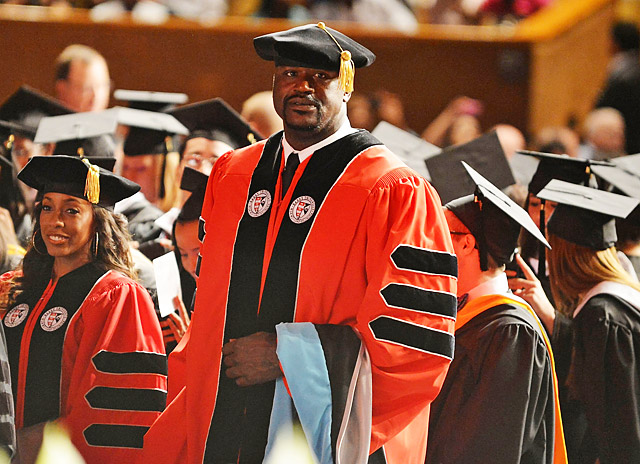Now it’s getting out of hand.
Earlier this week, retired professional basketball player and current professional dilettante Shaquille O’Neal earned a college degree. A doctorate, no less. For some reason, people are regarding this as a comment on the importance of education, rather than the publicity stunt that it is.
The story goes like this: Shaq left Louisiana State University after his junior year, and promised his mama he’d go back and complete his degree one day. Motherhood, the de facto 21st century American pastime…add some apple pie and we’ve got ourselves a pretty compelling political ad. Making America Stronger. A Better Future For Everyone. Standing Together On The Precipice Of History.
Education is important. Fine, you win that point. So is food, but no one will argue that a sticky bun from a vending machine is of comparable worth to a grilled skinless turkey breast.
In other words, no, education isn’t always important. Sometimes – a lot of the time – it’s a net negative, given that the time and resources spent earning that degree could have been spent doing something more productive and/or less expensive. An English degree and a computer science degree aren’t equivalent, similar, or even mutually intelligible. Same goes for the holders of those degrees, and their career prospects.
What’s Shaq’s degree in? It doesn’t matter. When you’re already worth hundreds of millions of dollars, the rules change. Earning a degree can’t possibly mean to Shaq what it means to your typical college student who’s working retail and eating cold pasta. It’s more like John F. Kennedy Jr.’s law degree – some slight form of validation for the degree holder.
What’s the purpose behind a college degree? That’s not a rhetorical question. Every answer we’ve ever heard has incorporated some combination of the following:
A. So you can earn more money.
B. To enrich your mind.
Okay. Can you put a price tag on either answer? The standard armchair analysis of A. is that people with college degrees earn an average of an extra million dollars or whatever over people who don’t.
Before we return to our regularly scheduled programming, let’s tear a hole in that one once and for all, shall we? For every board-certified neurosurgeon who earns a cumulative $10 million more in his career over a non-collegian, there are 9 liberal arts majors who might as well have started working right out of high school for all the difference going to college made.
What about B. then?
Don’t say that that’s a philistine concern, an education is priceless, and that you can’t attach a dollar figure to the process of enriching minds. Colleges do. In fact, it’s all they do. Enriching minds is as reducible to dollars and cents as anything else is.
Degrees are becoming inanimate versions of miniature dogs. Most of them are little more than conversation pieces to conspicuously show off to (and elicit comments from) other people.
This is only the latest in Shaq’s arsenal of degrees. He finished up his Louisiana State bachelor’s in 2000, and received an MBA in 2005. The former is in “general studies”, while he got the latter online from the University of Phoenix. Shaq’s new doctorin’ degree might be the most laughable of all. It’s in “human resource management”, from a school whose 2nd-most illustrious graduate is Miss Rhode Island 2008.
None of his degrees is in the traditional trivium or quadrivium, the classical underpinnings of a liberal education, so we can assume that Shaq’s B.A., MBA and Ph.D were earned less for mind-enrichment and more for financial reasons.
Yes, because Shaq is going to list those degrees on his résumé the next time he puts on a tie and applies for a job. Is anyone living in anything approaching reality here? Shaq and his mom certainly aren’t. Over the last 2 decades she’s enjoyed financial well-being light-years beyond what she had imagined, back when Shaq was an infant and his loser biological father was imprisoned for drug possession. All because her son was the single most devastating low-post force in the history of basketball. She needs Shaq to do coursework too? What the hell for?
This isn’t a comment on Shaq. It’s a comment on how The Importance of Education is being taken to preposterous levels. A college degree, bachelor’s or advanced, couldn’t mean less to someone whose non-academic skills can translate into money. On a smaller scale, it’s like a guy with an aptitude for installing appliances wasting thousands of dollars and several valuable appliance-installing years languishing in college. How can it not be better to do what you’re good at? Parents, maybe you can use that college fund to go on that Fijian vacation after all.
Shaq’s degrees might be ludicrous, but that doesn’t mean they were free. He spent $1,060 per credit hour to earn the Ph.D. Which required 54 credits. Shaq used to make enough to cover that, several times per game. He’s earning degrees out of a need for stimulation. Not that there’s anything wrong with stimulation, but a regular person who followed Shaq’s lead would be committing several months’ wages (and several years’ time) to that pursuit.
Actually, who are we kidding? They’d be borrowing from federally guaranteed student lenders and we all know it.
Look, Shaq can do whatever he wants. And has. Rich people have options. He’s been a TV analyst, recording artist, movie star, pretend cop (Miami Beach reserve police officer), and commercial spokesman. None of which required him to do anything academic. The glorification of education in all its empty versions is part of the problem. Instead of a Ph.D. with no intrinsic nor extrinsic value, let’s see Shaq go to trade school and learn to be an aircraft machinist. Which would be just as ridiculous, but significantly cheaper.
(Epilog: Here are even more stories about educated fools who borrowed tens of thousands of dollars to go to college. Some of them each owe more than $100,000. Lots of them dropped out. One is even a state representative who now waits tables. At least one is “following her dreams” by moving back in with Mom and Dad in the dismal little farm town she initially tried to escape from. And zero of them thought about how much this was going to cost and how long it was going to take to pay it all back. But yeah, you keep believing that going to college is the only way to get ahead. Knock yourself out.)
This article is featured in:
**The Totally Money Blog Carnival #69: Telling it Like it Is**




